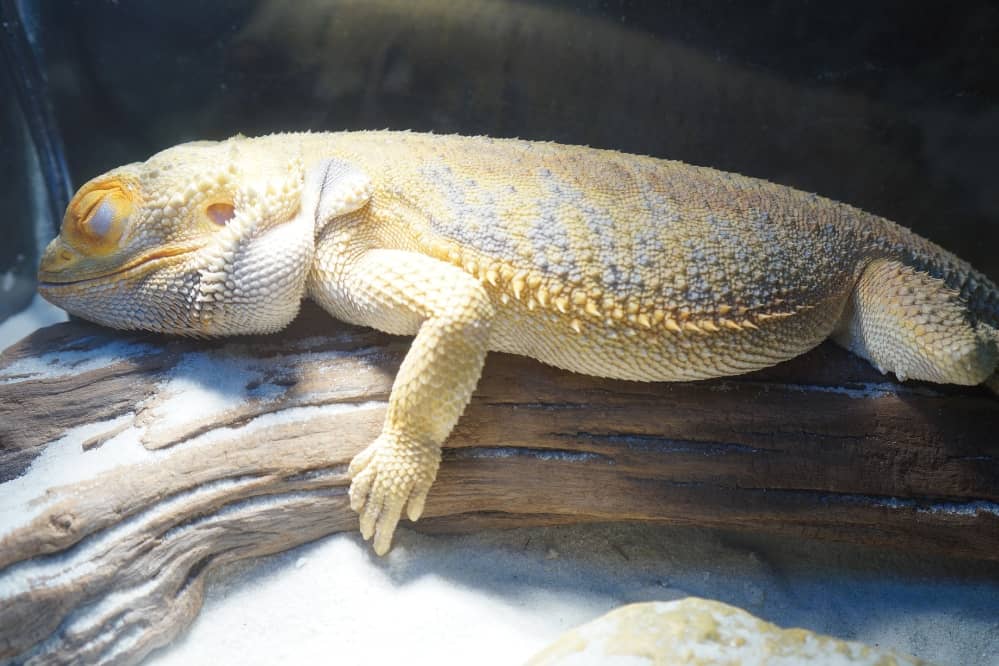Naturally, every pet lover wants to know about the life span of their new friend for two reasons before adopting a pet. First, he wants to know out of excitement and curiosity how many years he is supposed to share with his new pet. Secondly, he wants to assess how much his pet will cost him in terms of housing, feeding, care, and management in the long run.
The same is true of bearded dragon fanciers considering adopting a beardie for the first time. In fact, beardie fanciers are more curious because they may not easily find a seasoned beardie owner in their social circle to get some information. After all, still, bearded dragons are not very common in society though their popularity has been continuously on the rise since the last decade.
For those beardie fanciers who fall in the above category, bearded dragons can live much longer than you expect from these little reptiles. So by adopting a bearded dragon, you can expect to share many years of fun, love, and companionship. Let’s see how long a bearded dragon lives and how you can make your bearded dragon live a long and healthy life.
How Long Does A Bearded Dragon Live (In The Wild)?
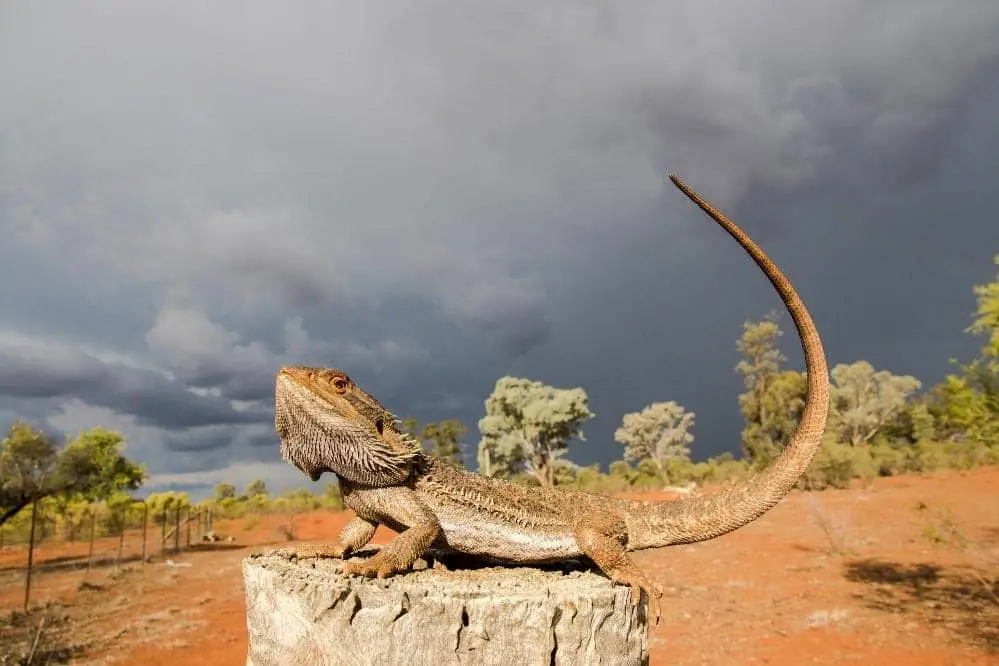
Generally, a bearded dragon can live for 5-8 years in the wild. This life span is much shorter than their average life span in captivity, and if a bearded dragon manages to live more than 8 years in the wild, he is considered old and a blessed beardie. Predators are the major contributors to reducing the longevity of beardies in the wild. Mostly bearded dragons are hunted by buzzards, hawks, wolves, foxes, big cats, dingoes, and even large lizards like goannas. In addition, bearded dragons belong to Australian deserts, where they have to face food scarcity and drought often. Predation, drought, and food scarcity all combined to reduce a beardie’s life span by 3-6 years at least.
How Long Does A Bearded Dragon Live (In Captivity)?
Generally, a bearded dragon can live for 8-15 years in captivity; however, the maximum age ever recorded for a bearded dragon is 18 years and 7 months. In captivity, bearded dragons live longer than that living in the wild because in captivity, bearded dragons get a healthy and surplus diet, water is available 24/7, and there are no predators.
Factors Influencing The Lifespan Of Bearded Dragons In Captivity
How long a bearded dragon can live depends on many factors. Most of these factors (except genetics) are in our control, and we can improve our bearded friends’ lifestyle so they can spend a few more years with us. Let us go over each of these factors one by one.
Diet
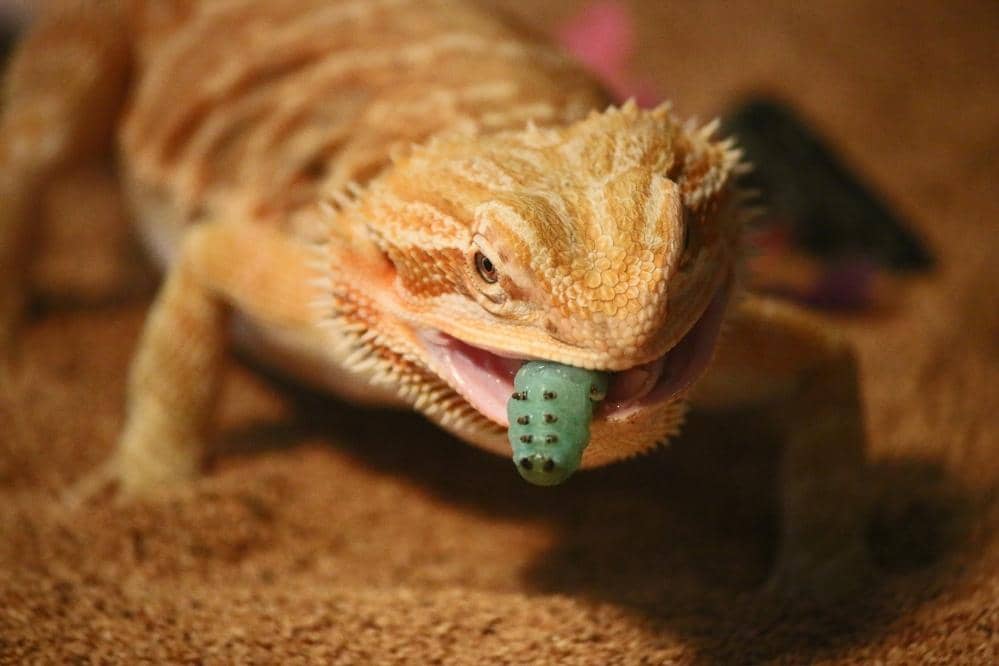
Diet is as important for a bearded dragon as for humans or other living organisms. You can maximize your beardie’s life expectancy by providing a healthy diet according to their age requirements. Generally, baby and juvenile beardies need more protein because of their rapid growth, so they should be fed more insects than vegetables. Once they reach puberty (18 months), you can offer them more vegetables than insects because they are not growing anymore. The table below shows the recommended insect to vegetable ratio and the number of daily meals according to the age of beardies.
| Age | Insect : Vegetable Ratio | No. of Insects Per Day | No. of Meals Per Day |
| Up to 3 months | 70% : 30% | 30 – 80 | 3 – 5 |
| 3 – 8 months | 70% : 30% | 30 – 80 | 2 |
| 8 – 12 months | 70% : 30% | 30 – 80 | 1 |
| 1 year + | 30% : 70% | 7 – 9 | 1st vegetable salad, 2nd day insect, 3rd day nothing and repeat |
In addition, you should know what vegetables and fruits are safe for the beardies and never forget to add calcium supplements to your beardie’s meal.
Habitat & Environment Inside Vivarium
Bearded dragons are sensitive to any change in their habitat and environmental conditions. So while preparing a vivarium, makes sure that it mimics their natural habitat. You must place tree branches, rocks, and hides to give the vivarium a natural look and make your bearded friend feel comfortable and happy. Other key factors that can affect the health and longevity of your bearded dragon are the tank’s size, temperature, humidity, UVB lights, and type of substrate. If any of these factors is not appropriately managed or missing, it can adversely affect your beardie’s health and even kill him.
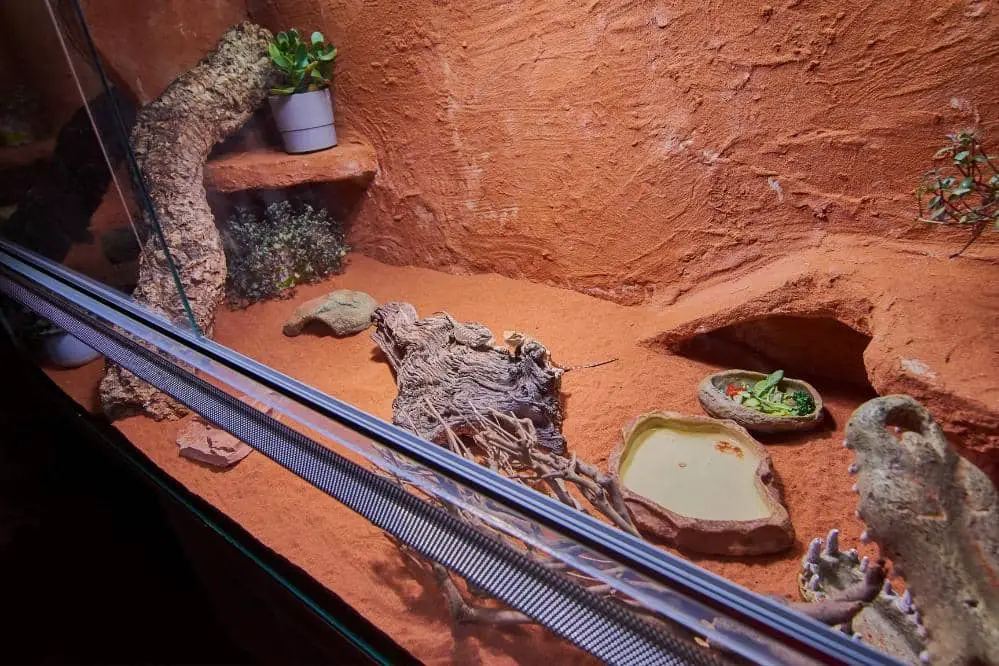
So ensure to use right size tank, right type of substrate, and high quality UVB lights, heater, thermostat, and thermometer, and check them after regular intervals to ensure that all instruments are working correctly. The table below shows the recommended values of different parameters.
| Age | Tank Size | Humidity | Basking | Cool Spot | Night Time |
| Baby | 20 -25 gallons | 30 – 40% | 100 – 110°F | 80 – 90°F | 70 – 75°F |
| Juvenile | 25 – 40 gallons | 30 – 40% | 95 – 100°F | 75 – 80°F | 70 – 75°F |
| Adult | 50-75 initially & then 100-120 gallons | 30 – 40% | 95 – 100°F | 75 – 80°F | 70 – 75°F |
Size
It has been observed that larger beardies generally have a longer life span than their smaller counterparts. This may be because; large bodied lizards are naturally relatively more robust and can withstand different environmental stressors longer. In addition, they can also recover more quickly from dire circumstances. So to ensure that your bearded dragon attains its maximum natural size, provide him with a well-balanced diet and manage environmental conditions well from day one of his life.
Sex
Keeping other factors aside, it has been observed that female beardies generally have a shorter life span as compared to male beardies. One reason could be the size; males are generally larger, and as mentioned earlier, larger lizards live longer. And breeding could be the other possible factor reducing the longevity of female beardies. Breeding and laying eggs is not only stressful and tiring but also has permanent implications on their bodies, like abdomen enlargement and weakness of the pelvis and hind limbs. Such changes shortens the life span to some extent. So if you own a female beardie and want to breed her, remember to take extra care of her in terms of feeding and management.
Genetics
Genetics definitely plays a significant role in determining the life span of bearded dragons, like any other living organism. Though it is the only factor that is considered out of our control, there is still something that we can do. Always adopt a beardie from a professional and responsible breeder; such breeders are more like to maintain healthy genes by continuous selection.
Regular Vet Checkups
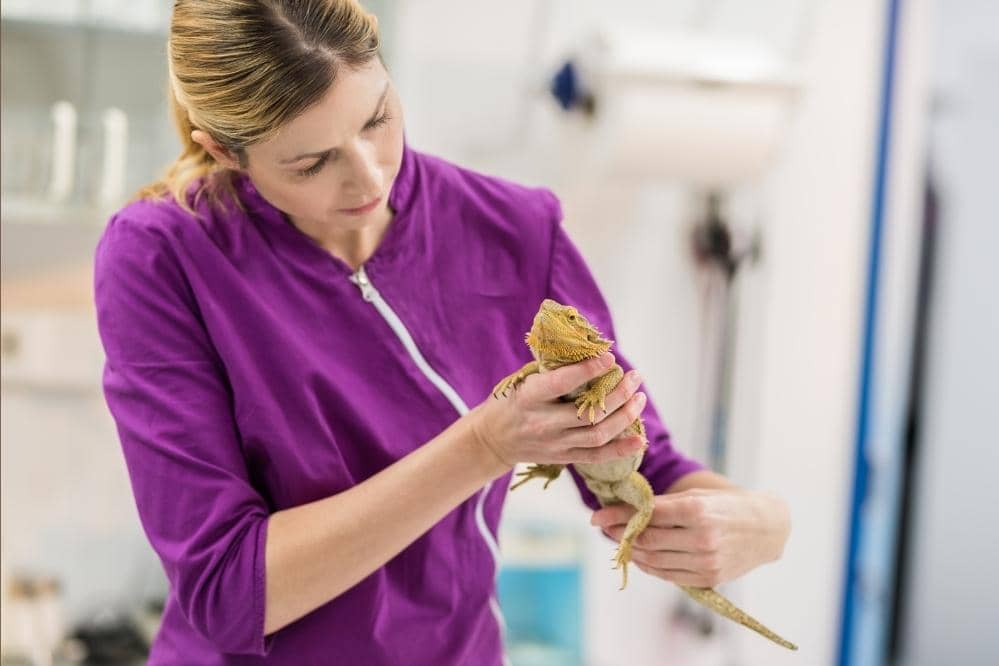
Though bearded dragons are quite robust and hardy and don’t get sick often if they are appropriately fed and their environment and habitat are correctly maintained. Still, chances are they can get sick, so regular medical checkup is necessary to detect any underlying issue and timely treatment. If you get late in diagnosing the problem, mostly it becomes difficult to save the beardie’s life.

